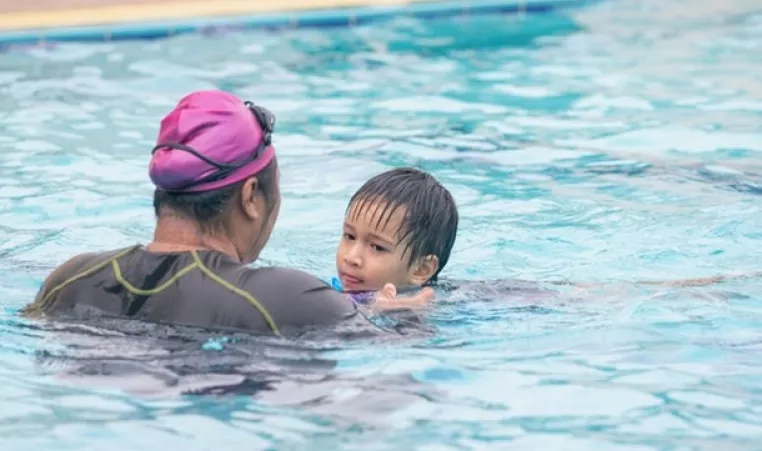
I don't remember a time in my life when I wasn't swimming. I took to the water the moment I jumped in, and it's been an integral part of my life ever since. I taught swim lessons through high school, and when I became a parent, I knew that I wanted my children to get in the water as early and as often as possible. But never having been a parent, some of the logistics eluded me. For instance, how long should my kid take swim lessons? As an athlete, I was in the water almost every day, all year round, but years ago, when I was learning to swim, ideas on what was appropriate were different. What are the current recommendations?
I reached out to the American Academy of Pediatrics (AAP) and their representative, Lisa Black, tells Romper that the AAP's official position is that “Parents should monitor their child’s progress during swim lessons and continue their lessons at least until basic water competence is achieved. Basic swim skills include ability to enter the water, surface, turn around, propel oneself for at least 25 yards, float on or tread water, and exit the water.” Black notes that the AAP recommends that parents get their children in the pool and learning as early as 1 year old. The swimming classes for babies that young mainly focus on their ability to turn themselves over and begin to float. Drowning happens quickly, so every little bit of time saved can make all the difference.
Beyond the official recommendations of the AAP, I wanted to find out how current swim instructors determine a child's preparedness to be alone in the water, and find out how often should my kid should take swim lessons. I contacted Lindsay Mondick, Y-USA’s Senior Manager of Aquatics, and she tells Romper that just like so many things we teach our children, "When it comes to teaching someone to swim, consistency is key." After all, it's a complex process that requires multiple areas of the brain to be activated at once. "We know that children learn best through repetition and consistency in practice," Mondick says. "When learning to swim, the repetition and consistency can help enforce the swim skills being taught and increase muscle memory."
The main message that both the AAP and Mondick are delivering is that, as Mondick says, "Swimming lessons for children are truly successful when kids are coming to class regularly." Whether that is once a week, twice a week, three times a week — that's not as important. What is key is that they keep going. "There is a misconception that there is an optimal swim lesson 'season.' The general rule is that the more your child can attend classes, the faster they will progress and retain what they are learning," Mondick says.
She also tells Romper that it is essential that parents understand that children are individuals, and will gain the skills at their own pace. For my son, who is autistic, at age 11, he is still not ready for the water. He had had 10 sessions, each for 12 weeks, and still struggles with floating. (I have learned this is quite common for kids with autism.) My daughter only required the barest of lessons before finding her inner fish.
Kids are each going to learn to swim in their own timelines, but these experts are saying that you just have to keep at it until they are comfortable in the water and also have a keen awareness of water safety. And who knows, your child just might discover a love for something that will last a lifetime.
By Cat Bowen
Aug 21, 2019

